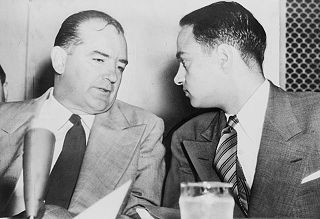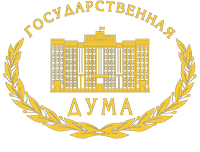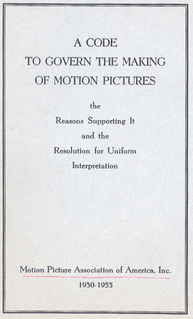 W
WCensorship of LGBT issues is practised by a number of countries around the world. They may take a variety of forms, including "no promo homo laws" in several states of the United States, the Russian ban on "promotion of non-traditional sexual relationships", the Hungarian ban on "content portraying or promoting sex reassignment or homosexuality", and laws in Muslim-majority states such as Saudi Arabia, Pakistan, and Malaysia prohibiting advocacy that offends Islamic morality.
 W
WAnti-LGBT curriculum laws, sometimes referred to as no promo homo laws, are laws approved by various U.S. states that prohibit or limit the mention or discussion of homosexuality and transgender identity in public schools. In theory, these laws mainly apply to sex ed courses, but they can also be applied to other parts of the school curriculum as well as to extracurricular activities and organizations such as gay–straight alliances.
 W
WBisexual erasure or bisexual invisibility is the tendency to ignore, remove, falsify, or re-explain evidence of bisexuality in history, academia, the news media, and other primary sources. In its most extreme form, bisexual erasure can include the belief that bisexuality itself does not exist.
 W
WThe Briggs Initiative, officially California Proposition 6, was a ballot initiative put to a referendum on the California state ballot in the November 7, 1978 election. It was sponsored by John Briggs, a conservative state legislator from Orange County. The failed initiative sought to ban gays and lesbians from working in California's public schools.
 W
WThe Celluloid Closet is a 1995 American documentary film directed and written by Rob Epstein and Jeffrey Friedman. The film is based on Vito Russo's 1981 book The Celluloid Closet: Homosexuality in the Movies, and on lecture and film clip presentations he gave in 1972–1982. Russo had researched the history of how motion pictures, especially Hollywood films, had portrayed gay, lesbian, bisexual and transgender characters.
 W
W"Don't ask, don't tell" (DADT) was the official United States policy on military service by gay men, bisexuals, and lesbians, instituted during the Clinton Administration. The policy was issued under Department of Defense Directive 1304.26 on December 21, 1993, and was in effect from February 28, 1994, until September 20, 2011. The policy prohibited military personnel from discriminating against or harassing closeted homosexual or bisexual service members or applicants, while barring openly gay, lesbian, or bisexual persons from military service. Despite marketing to the contrary, it was functionally little different from the Pentagon policy ban that dated to World War II but codified into United States federal law Pub.L. 103–160, which was signed November 30, 1993. The policy prohibited people who "demonstrate a propensity or intent to engage in homosexual acts" from serving in the armed forces of the United States, because their presence "would create an unacceptable risk to the high standards of morale, good order and discipline, and unit cohesion that are the essence of military capability".
 W
W"Gay agenda" is a term introduced by sectors of the Christian religious right as a disparaging way to describe the advocacy of cultural acceptance and normalization of non-heterosexual sexual orientations and relationships. The term originated among social conservatives in the United States and has been adopted in other nations with active anti-LGBT movements such as Hungary and Uganda.
 W
WThe "lavender scare" was a moral panic during the mid-20th century about homosexual people in the United States government and their mass dismissal from government service. It contributed to and paralleled the anti-communist campaign known as McCarthyism and the Second Red Scare. Gay men and lesbians were said to be national security risks and communist sympathizers, which led to the call to remove them from state employment. It was thought that gay people were more susceptible to being manipulated, which could pose a threat to the country.
 W
WThe Russian federal law "for the Purpose of Protecting Children from Information Advocating for a Denial of Traditional Family Values," also known in English-language media as the gay propaganda law and the anti-gay law, is a bill that was unanimously approved by the State Duma on 11 June 2013, and was signed into law by President Vladimir Putin on 30 June 2013.
 W
WLGBT-free zones or LGBT ideology-free zones are municipalities and regions of Poland that have declared themselves unwelcoming of an alleged "LGBT ideology", in order to ban equality marches and other LGBT events. By June 2020, some 100 municipalities (map) and five voivodships, encompassing a third of the country, had adopted resolutions which have been characterized as "LGBT-free zones". In September 2021, four of the voivodships withdrew the measures, after the EU threatened to withhold funding.
 W
WThe Motion Picture Production Code was a set of industry guidelines for the self-censorship of content that was applied to most United States motion pictures released by major studios from 1934 to 1968. It is also popularly known as the Hays Code, after Will H. Hays, who was the president of the Motion Picture Producers and Distributors of America (MPPDA) from 1922 to 1945. Under Hays's leadership, the MPPDA, later known as the Motion Picture Association of America (MPAA) and now simply the Motion Picture Association (MPA), adopted the Production Code in 1930 and began rigidly enforcing it in mid-1934. The Production Code spelled out what was acceptable and unacceptable content for motion pictures produced for a public audience in the United States.
 W
WSave Our Children, Inc. was a political coalition formed in 1977 in Miami, Florida in the United States to overturn a recently legislated county ordinance that banned discrimination in areas of housing, employment, and public accommodation based on sexual orientation. The coalition was publicly headed by celebrity singer Anita Bryant, who claimed the ordinance discriminated against her right to teach her children Biblical morality. It was a well-organized campaign that initiated a bitter political fight between gay activists and Christian fundamentalists. When the repeal of the ordinance went to a vote, it attracted the largest response of any special election in Dade County's history, passing by 70%. In response to this vote, a group of gay and lesbian community members formed Pride South Florida, now known as Pride Fort Lauderdale, an organization whose mission was to fight for the rights of the gay and lesbian community in South Florida.
 W
WSection 28 or Clause 28 were a series of laws across Britain that prohibited the "promotion of homosexuality" by local authorities. Introduced by Margaret Thatcher's Conservative government, it was in effect from 1988 to 2000 and 2003. It caused many organisations such as lesbian, gay, bisexual and transgender student support groups to close or limit their activities or self-censor.